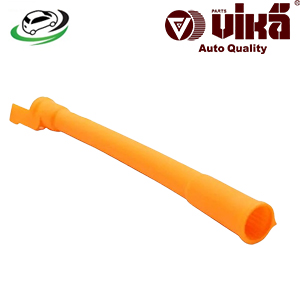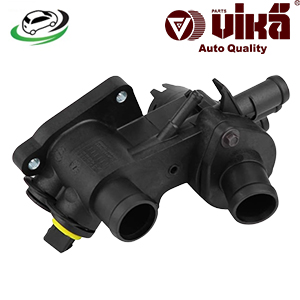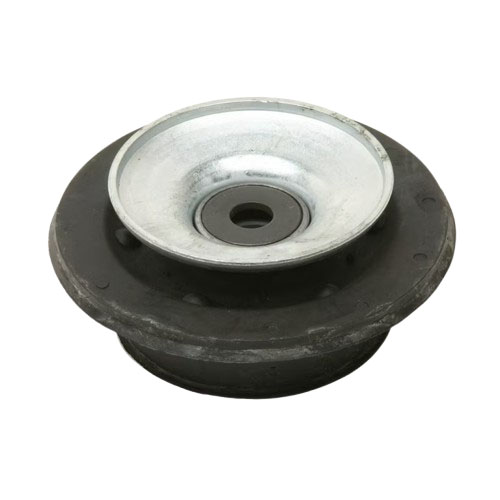-15%
Get Volkswagen Jetta MK2 Suspension Strut Mount 191412329 in Kenya
The strut mount is a crucial component in a vehicle’s suspension system. It connects the strut assembly to the vehicle body, providing a pivotal point for strut movement while absorbing shocks and vibrations. Understanding the structure, function, types, benefits, common issues, and maintenance of strut mounts is essential for ensuring optimal vehicle handling, ride comfort, and overall performance.
Structure and Function of Strut Mounts
Strut mounts serve as the interface between the strut assembly and the vehicle chassis. They support the weight of the vehicle and facilitate smooth suspension movement.
Components of a Strut Mount
- Mounting Plate: The base that attaches to the vehicle body, providing a secure anchor for the strut assembly.
- Bearing (in some designs): Allows the strut to pivot, facilitating steering movement.
- Rubber or Polyurethane Insulator: Absorbs shocks and vibrations, enhancing ride comfort and reducing noise.
- Dust Boot: Protects the bearing and other internal components from dirt and debris.
Function in the Suspension System
The primary functions of strut mounts are to:
- Secure the Strut Assembly: Strut mounts anchor the strut to the vehicle body, ensuring it stays in place during suspension movement.
- Absorb Shocks and Vibrations: The rubber or polyurethane insulator dampens shocks and vibrations from the road, contributing to a smoother ride.
- Facilitate Steering (in strut mount with bearings): In vehicles with MacPherson strut suspensions, the strut mount bearing allows the strut to rotate with the steering, providing smoother and more responsive steering.
Types of Strut Mounts
Strut mounts come in various types, each designed to suit different suspension systems and vehicle performance requirements.
Standard Strut Mounts
Standard strut mounts are common in many vehicles. They provide basic functionality, ensuring secure attachment and shock absorption for everyday driving conditions.
Bearing Strut Mounts
Bearing strut mounts include a built-in bearing that allows the strut to pivot, facilitating steering movement. These are commonly used in vehicles with MacPherson strut suspensions.
Performance Strut Mounts
Performance strut mounts are designed for high-performance vehicles. They are often made from stronger materials, such as reinforced rubber or polyurethane, and provide improved handling and responsiveness.
Benefits of Strut Mounts
Strut mounts offer numerous benefits that enhance vehicle handling, ride comfort, and overall safety.
Improved Ride Comfort
Strut mounts play a crucial role in absorbing shocks and vibrations from the road. By isolating these impacts, they provide a smoother and more comfortable ride for vehicle occupants.
Enhanced Handling
High-quality strut mounts ensure that the strut assembly remains securely attached to the vehicle body, maintaining proper alignment and handling characteristics. This stability is essential for precise and responsive steering.
Noise Reduction
The rubber or polyurethane insulator in strut mounts helps reduce noise generated by the suspension system. This noise reduction enhances the overall driving experience by providing a quieter cabin environment.
Longevity and Durability
Modern strut mounts are designed for durability, using materials that resist wear and tear. This longevity reduces the need for frequent replacements and maintenance, contributing to overall vehicle reliability.
Common Issues and Maintenance of Strut Mounts
Like all mechanical components, strut mounts can experience wear and tear over time. Regular inspection and maintenance are crucial for ensuring their proper function.
Signs of Worn Strut Mounts
- Clunking Noise: A clunking or knocking noise when driving over bumps or during steering can indicate worn or damaged strut mounts.
- Poor Handling: Decreased steering response, increased body roll, or uneven tire wear can be signs of strut mount issues.
- Visible Wear: Cracks, splits, or other visible damage to the rubber or polyurethane insulator suggest that the strut mounts may need replacement.
- Excessive Vibration: Increased vibration felt in the steering wheel or cabin can indicate worn strut mounts.
Maintenance Tips
- Regular Inspection: Periodically inspect the strut mounts for signs of wear, damage, or looseness.
- Proper Installation: Ensure that strut mounts are installed correctly, with proper torque on mounting bolts and a good seal.
- Replace in Pairs: When replacing strut mounts, it is recommended to replace them in pairs (both front or both rear) to maintain balanced handling and performance.
- Quality Parts: Use high-quality replacement parts to ensure durability and reliable performance.
Advances in Strut Mount Technology
Modern advancements in strut mount technology have led to improved performance, durability, and ease of maintenance.
Advanced Materials
The use of advanced materials, such as high-strength rubber compounds and polyurethane, enhances the strength and longevity of strut mounts. These materials are designed to withstand the stresses of modern driving conditions.
Precision Engineering
Improved manufacturing techniques, such as CNC machining and precision molding, ensure that strut mounts meet high standards of quality and consistency. This precision results in better performance and reliability.
Enhanced Designs
Innovative designs, such as integrated bearings and reinforced structures, provide greater flexibility and customization for different driving conditions and performance needs. These designs improve handling and allow for fine-tuning of the suspension system.
Follow us on Facebook for more parts.





